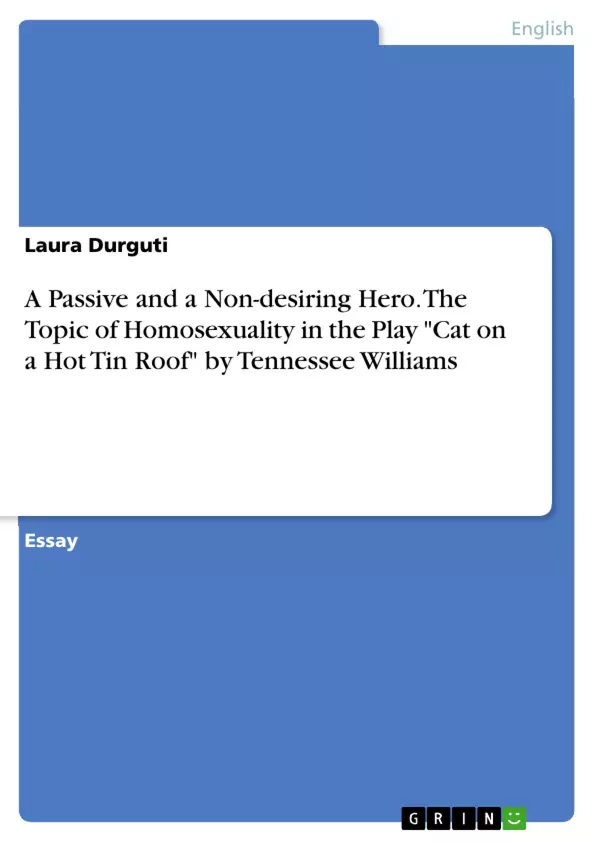In the play "Cat on a Hot Tin Roof" Tennessee Williams plunges the audience in the middle of a broken family arguing about Big Daddy’s cancer on the one hand and about Brick’s homosexuality on the other. However, the critics often argue about the topic of homosexuality in Tennessee Williams Play "Cat on a Hot Tin Roof". While for Nicholas de Jongh this drama is a play about homosexuality, John Clum on the other side affirms that there is nothing gay in this play. Both studies argue about homosexuality because Tennessee Williams evokes the topic of male homosexuality indirectly. Through the use of circumlocution, the problem of communication and Brick’s passiveness, Tennessee Williams demonstrates that the topic of male same-sex desire is a problematic issue thus drawing attention to the societal disgust for homosexuality.
Table of Contents
- A Passive and a Non-desiring Hero
- The Topic of Homosexuality in the Play Cat on a Hot Tin Roof
- Circumlocution as Indicator of Brick's Homosexuality
- Big Daddy's Difficulties of Communication
- Brick as a Passive Hero
Objectives and Key Themes
This paper explores the theme of homosexuality in Tennessee Williams’s play Cat on a Hot Tin Roof, analyzing how the author indirectly portrays Brick’s same-sex desires through the use of circumlocution, communication issues, and Brick’s passivity. It examines how these elements reflect the societal disgust and repression of homosexuality during the time period in which the play is set.
- Homosexuality as a Taboo Topic
- The Use of Circumlocution and Indirect Language
- Brick's Passivity and Non-Desiring Nature
- The Role of Silence and Communication Barriers
- Societal Disgust for Homosexuality
Chapter Summaries
- A Passive and a Non-desiring Hero: This section introduces the concept of Brick as a passive and non-desiring hero, highlighting his inability to actively engage with his family and the world around him. It establishes a connection between Brick's passiveness and his repressed homosexuality, arguing that it serves as a paralyzing force in his life.
- The Topic of Homosexuality in the Play Cat on a Hot Tin Roof: This section delves into the topic of homosexuality in the play, exploring how Tennessee Williams indirectly evokes Brick's same-sex desires through subtle language and character interactions. It argues that the play’s indirect approach reflects the social stigma surrounding homosexuality at the time.
- Circumlocution as Indicator of Brick's Homosexuality: This section analyzes the excessive use of circumlocution throughout the play as an indicator of Brick's homosexuality. It highlights how characters avoid directly mentioning his sexuality while still alluding to his homoerotic relationship with his friend Skipper. This circumlocution further emphasizes the societal taboo associated with same-sex desires.
- Big Daddy's Difficulties of Communication: This section explores the communication barriers between Big Daddy and Brick. It argues that Big Daddy's struggles to talk about sensitive topics, including Brick’s sexuality, highlight the difficulty of addressing taboo subjects in a society that represses them. The section emphasizes the role of silence and its symbolic significance in the play.
Keywords
Key terms and topics explored in this analysis include: homosexuality, circumlocution, indirect language, communication barriers, societal repression, taboo, passiveness, non-desiring hero, societal disgust, Tennessee Williams, Cat on a Hot Tin Roof, Brick Pollitt, Skipper, Big Daddy, Big Mama, Maggie,.
Frequently Asked Questions
How is homosexuality addressed in 'Cat on a Hot Tin Roof'?
Homosexuality is addressed indirectly through the character of Brick Pollitt, using circumlocution and subtext rather than explicit statements, reflecting the societal taboos of the 1950s.
What is the significance of Brick's passivity?
Brick's passivity and "non-desiring" nature serve as a defense mechanism against his repressed feelings and the societal pressure to conform to traditional masculine roles.
What role does the character Skipper play?
Skipper was Brick's close friend; their relationship is the source of the play's central conflict regarding Brick's true sexual identity and his subsequent alcoholism.
How does Tennessee Williams use circumlocution?
Characters talk around the subject of homosexuality using vague terms, which highlights the "mendacity" (lying/hypocrisy) that Brick claims to despise in his family.
Why does Big Daddy struggle to communicate with Brick?
Their struggle reflects a generational gap and the inability of a patriarchal figure to confront a topic as socially unacceptable as male same-sex desire.
- Quote paper
- Laura Durguti (Author), 2016, A Passive and a Non-desiring Hero. The Topic of Homosexuality in the Play "Cat on a Hot Tin Roof" by Tennessee Williams, Munich, GRIN Verlag, https://www.grin.com/document/418106



